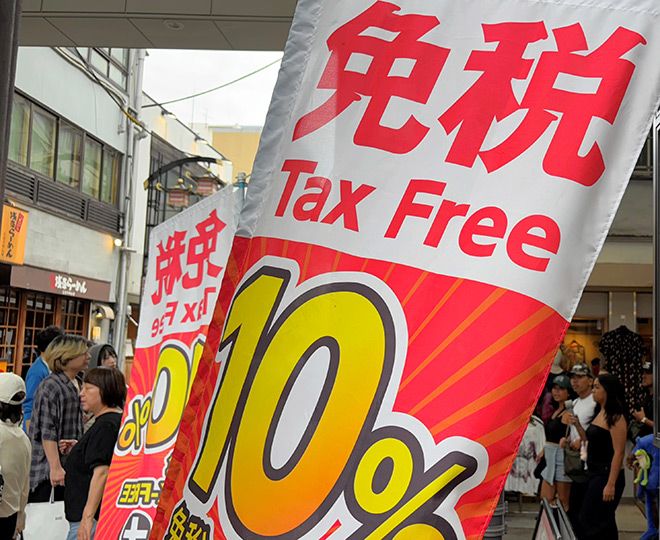Lawmakers in both the ruling and opposition parties are heightening calls for a review or even abolishment of the duty-free system for foreign visitors, saying it has become a hotbed of fraudulent activity.
A study group in the ruling Liberal Democratic Party submitted a proposal to the chair of the LDP’s Research Commission on the Tax System on June 12, saying the system that waives the consumption tax on duty-free products should end.
Rising prices have put a damper on spending in Japan, leading to decreasing revenue from the consumption tax.
Eliminating the duty-free system could help to increase revenue, given the huge crowds of tourists entering the country, the group said.
Another growing problem is that foreign visitors are reselling the tax-free goods for a profit while in Japan. Some have spent enormous sums on duty-free goods but are leaving Japan without their purchases.
“The ‘baku-gai’ shopping sprees by foreigners is not in line with our vision of a tourism-oriented country,” the group said.
SOARING NUMBERS
The duty-free system began in 1989, when the consumption tax was first introduced at a rate of 3 percent.
Non-residents who have been in Japan for less than six months can buy goods at duty-free stores upon completing identification and other procedures. They are prohibited from reselling these products in Japan.
When the system was introduced, the number of annual visitors to Japan was 2.83 million.
By 2023, the visitor number had jumped ninefold to 25.06 million. About 160 billion yen ($1.1 billion) in consumption taxes was knocked off their purchases made at duty-free stores.
In 2024, spending by visitors to Japan is estimated to be in the 8-trillion-yen range, including more than 200 billion yen at duty-free stores.
As of the end of September 2024, there were 61,392 duty-free stores operating in Japan, including souvenir shops, electronics retailers and drug stores.
Against this backdrop, Taro Aso, the LDP’s top adviser, set up the study group in May to review the duty-free system.
“If we abolish (the system), we will receive 200 billion yen, so it is worth considering,” Aso, a former prime minister, said at the time.
ABUSE OF SYSTEM CONTINUES
Duty-free products are defined as “goods used for normal daily living.” Individual spending on consumable goods in one day is limited to 500,000 yen at the same duty-free store.
However, according to the Finance Ministry, at least 690 people left Japan between fiscal 2022 and fiscal 2023 after each purchasing more than 100 million yen’s worth of duty-free goods. The total amount spent was 233.2 billion yen.
The government suspects many of these big spenders did not have the duty-free items in their possession when they left the country. They most likely resold the products in Japan.
MORE FRAUD
Operators of duty-free stores have also been found abusing the system.
Unscrupulous vendors have submitted fake reports about sales of tax-free goods to visitors and fraudulently received consumption tax refunds.
To clean up the system, the government will introduce a new “refund method” system in November 2026.
Duty-free stores will sell goods at prices that include the consumption tax. The buyers will receive a refund for the tax amount after they complete departure procedures and basically show they have not unloaded the goods.
However, this method will not be needed if the government follows the Aso group’s recommendation to end the duty-free system.
‘SQUEEZING TAXPAYERS’
Opposition parties are also calling for changes.
At a Lower House Budget Committee meeting in February, Kensuke Onishi, a member of the main opposition Constitutional Democratic Party of Japan, said a review of the duty-free measures is needed.
“Instead of squeezing taxpayers who are suffering from high prices, foreigners who can afford to travel should be paying,” Onishi said.
Prime Minister Shigeru Ishiba responded with caution, saying, “Some purchases can only be made in Japan.”
Hideki Tomonaga, a licensed tax accountant and former official of the Finance Ministry’s Tax Bureau, noted that some countries do not have a duty-free system, some have abolished it, and some do not have a consumption tax to begin with.
“Instead of looking to other countries to decide, we should make the system simple enough for Japanese consumers to feel that it is fair and acceptable,” Tomonaga said.
According to the Finance Ministry, many countries in the Organization for Economic Cooperation and Development (OECD) have introduced duty-free systems.
However, Britain abolished the duty-free system after leaving the European Union.
(This article was written by Yuta Hanano and Jun Miura.)


AloJapan.com